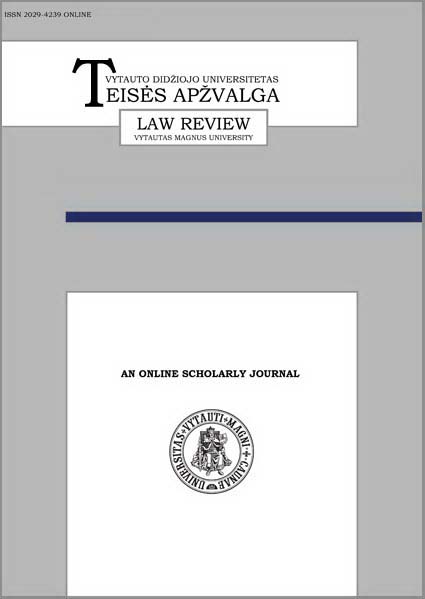Ar privilegijų įsigyti valstybinę žemę ne aukciono būdu nustatymas tam tikriems subjektams atsižvelgiant į jų teisinę formą nepažeidžia LR Konstitucijoje numatytų teisingumo bei asmenų lygybės prieš įstatymus principų?
Does the Establishment of Privileges for Acquisition of State Land not by Auction for Certain Entities, Considering Their Legal form, does not Violate the Principles of Justice and Equality of Persons, Provided in the Constitution of the Republic of
Author(s): Augustė VitkauskienėSubject(s): Law, Constitution, Jurisprudence, Civil Law
Published by: Vytauto Didžiojo Universitetas
Keywords: The principle of justice; The principle of equality of the person before the law; State land; Acquisition of state land by non-auction;
Summary/Abstract: The aim of this work is to analyze whether the current legal regulation, which provides for the possibility to acquire state land by non-auction only for certain entities, does not violate the principles of justice and equality of persons before the law. To date, a number of cases have reached the courts, in which persons have owned land plots for more than 40 years, but according to the laws of the Republic of Lithuania they do not have the right to acquire them by auction because their legal regime / description does not comply with the law. Thus, a legal situation arises where the law does not provide for certain operating entities. Hence, they are now unable to exercise their rights to land plots managed for many years. That is why the chosen investigation is related to the ongoing cases in the courts of the Republic of Lithuania, when certain entities were granted the use of state land, but due to non-compliance of the legal form (definition) with the applicable laws certain entities lose the right to acquire land plots not auctioned. It is important that the Law on Land of the Republic of Lithuania defines a group of entities entitled to acquire state land plots not by auction. Therefore, Article 10 of the Law on Land without providing for the possibility of gardening associations on an equal or even identical basis with other communities, e.g. the above-mentioned principles enshrined and guaranteed in the Constitution, may be violated for the gardeners' association and its members to acquire land plots under the same conditions as the rights of associations and their members performing similar functions as gardeners' associations and similar objectives may be restricted, e.g. essentially the same situations are interpreted and treated differently, and essentially the same persons are treated differently. Four main methods were used in the study: analysis of legal literature, descriptive, comparative and logical. All the above methods were used in an integrated way, considering the specific problems raised in the chapters / subsections analyzed in this work. The work consists of four sections. Taking into account that the legal system is based on legal principles, the purpose of which is to direct the entire legal system, the first and second chapters describe and explain the concept of justice and personal equality before the law from the point of view of philosophers and the Constitutional Court of the Republic of Lithuania. The third chapter analyzes what is considered state land, how its acquisition by non-auction is regulated and what reasons determined that the laws of the Republic of Lithuania established the possibility to acquire state land by non-auction. Finally, the fourth chapter analyzes the specific situation taking into account Article 10 of the Law on Land of the Republic of Lithuania, which strictly defines the group of entities entitled to acquire state land plots by non-auction, which led to the main question analyzed in this work, whether Art. 10, by failing to establish the possibility for other entities, which are equivalent or even identical to those provided by law, to acquire land plots under the same conditions, does not violate the principles enshrined and guaranteed in the Constitution, such as justice and equality of the person before the law. The investigation found that the principles of justice and equality of the person are violated when: (i) the balance of interests is not ensured, e.g. the laws applied in the situation in question are disproportionate to the situation (formed by case law) and the aim pursued; (ii) the established legal regulation restricts the rights of one person more than another, although there are no essential differences between certain subjects; (iii) the legislature did not take into account the importance and nature of the regulated economic relations by regulating economic activities in a differentiated manner and setting certain conditions. In addition, it is important to note that the land reform was launched to ensure the continuity of the property rights of the Lithuanian state and its citizens, which is why the laws related to land acquisition were drafted so that entities that manage land plots could acquire it non-auctioned, thus preserving the continuity of management, use and disposal. After analyzing the concept of the principles of justice and equality before the law, the concept of state land, its acquisition methods and the privileges of non-auction acquisition of state land by certain laws for certain entities (gardeners), it is established that the current legal regulation of non-auctioned land is not sufficiently developed, as entities (gardeners), between which there are no substantial differences justifying the different granting of rights (privileges), are treated differently, thus depriving such persons of the opportunity to acquire public land by non-auction, as well as the principles of justice and equality before the law.
Journal: Teisės apžvalga
- Issue Year: 2021
- Issue No: 1(23)
- Page Range: 88-108
- Page Count: 21
- Language: Lithuanian

